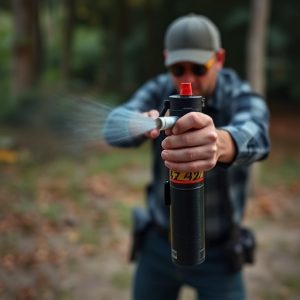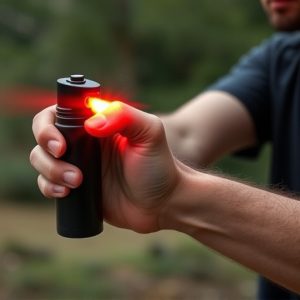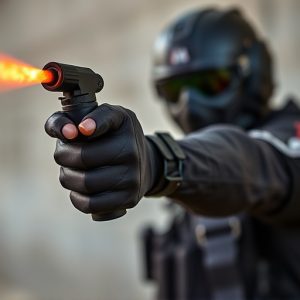Protecting Pets: Treating & Preventing Pepper Spray Exposure
Pets exposed to pepper spray require immediate action. Rinse affected areas with water for 15 minute…….
Pets exposed to pepper spray require immediate action. Rinse affected areas with water for 15 minutes, seek veterinary care for medication and treatment, and monitor for delayed reactions. In case of exposure, create a safe space, rinse eyes gently for 15 minutes, and consult a vet if symptoms persist. Responsible storage practices and understanding local regulations are crucial to prevent accidental exposure.
Personal safety inflammatory pepper spray can be a controversial topic, especially when considering its impact on pets. This comprehensive guide delves into the effects of pepper spray on animals, offering crucial insights for pet owners. We explore immediate actions to take if your pet is exposed, including treating physical symptoms and calming techniques. Additionally, we discuss legal aspects and responsible use, emphasizing preventive measures to protect your pets from such exposure. By understanding these steps, you can ensure your pet’s well-being in potential high-risk situations.
- Understanding Pepper Spray and Its Effects on Pets
- Immediate Steps to Take After Your Pet is Exposed
- Treating Physical Symptoms and Calming Your Pet
- Legal Considerations and Responsible Use
- Preventive Measures: Protecting Your Pets from Pepper Spray Exposure
Understanding Pepper Spray and Its Effects on Pets
Pepper spray, a powerful irritant designed for personal safety, can have unexpected effects on pets if they come into contact with it. Pets, especially dogs and cats, may suffer from respiratory distress, inflammation of the eyes and skin, and even temporary blindness due to the spray’s capsaicin content. The intensity of these symptoms varies based on the pet’s exposure duration and the amount of spray absorbed.
Treating pets exposed to pepper spray requires immediate action. Rinse the affected areas with large amounts of water for at least 15 minutes to dilute the capsaicin. Seek veterinary assistance promptly, as they can provide specialized care and medications to alleviate symptoms. Keep an eye on your pet’s behavior and health for several days following exposure, as some effects may persist.
Immediate Steps to Take After Your Pet is Exposed
If your pet has been exposed to pepper spray, immediate action is crucial for their safety and well-being. The first step is to remove them from the affected area as quickly as possible to prevent further exposure. Rinse their face, eyes, and nose gently with plenty of clean water for at least 15 minutes. This helps to dilute and wash away any remaining spray residue, minimizing its impact.
After rinsing, seek veterinary care promptly. Pepper spray can cause respiratory distress, inflammation, and discomfort in pets. A vet can assess the severity of the reaction, prescribe necessary medications, and offer additional treatment options. They may also recommend monitoring your pet for any delayed reactions or long-term effects.
Treating Physical Symptoms and Calming Your Pet
When pets are exposed to pepper spray, it’s crucial to address their physical symptoms promptly. Similar to human reactions, animals may experience respiratory distress, tears, coughing, or difficulty breathing due to the capsaicin in the spray. To treat these symptoms, ensure your pet is in a well-ventilated area and rinse their eyes gently with warm water for at least 15 minutes. This helps to dilute the pepper spray residue. If your pet is struggling to breathe, seek veterinary assistance immediately.
Calming a pet after exposure requires patience and care. Just as humans can be panicked by such an experience, animals may also exhibit signs of fear or aggression. Create a safe, quiet space for your pet and use calming techniques like soft music or familiar blankets to help them relax. Avoid any actions that might escalate the situation, as pets may react defensively if they feel threatened. Remember, even though symptoms can be treated, preventing exposure is the best course of action for treating pets exposed to pepper spray.
Legal Considerations and Responsible Use
When considering personal safety with inflammatory pepper spray, it’s crucial to understand the legal landscape surrounding its use. The legality varies significantly from region to region, so individuals must familiarize themselves with local laws and regulations before purchasing or carrying such a device. Non-compliance can result in severe penalties, including fines and imprisonment.
Responsible use is equally important, especially when pets are involved. In the event of exposure, treating pets exposed to pepper spray requires immediate action. This includes washing their faces and eyes gently with warm water for at least 15 minutes and seeking veterinary care if symptoms persist or worsen. Responsible users should also store pepper spray out of reach of children and pets, ensuring it’s in a secure, locked container to prevent accidental discharge or misuse.
Preventive Measures: Protecting Your Pets from Pepper Spray Exposure
When carrying and using pepper spray for personal safety, it’s crucial to be mindful that pets can also be inadvertently exposed. Preventive measures are key in protecting your furry friends from the harmful effects of pepper spray. Keep the spray out of reach and ensure it is stored securely, preferably in a locked area, to prevent any accidental exposure by curious pets.
In case of accidental exposure, immediate action is necessary. If your pet comes into contact with pepper spray, take them to a well-ventilated area and remove any contaminated clothing or bedding. Treating pets exposed to pepper spray involves thorough rinsing of the eyes and skin with plenty of water for at least 15 minutes. Seek veterinary care if irritation persists or if breathing difficulties arise, as these symptoms may indicate more severe exposure.
Protecting your pets from pepper spray exposure is crucial, as their sensitive systems can be severely affected. By understanding the immediate and long-term effects, taking prompt action after exposure, treating symptoms effectively, and implementing preventive measures, you can ensure your furry companions’ safety. Remember, responsible use and legal considerations are essential when carrying and employing pepper spray to protect your pets and yourself. Stay informed, stay safe, and keep your pets secure from the harmful effects of this inflammatory agent.


